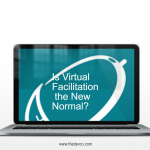
This is my second blog on why we think virtual facilitation is the future. These are the words of our learners, clients, and sponsors.
We consistently find that there are far more positive effects of virtual training than there are negative effects.
In this blog, my focus is on how team bonding is enhanced as a result of virtual learning events.
Getting to know people – the icebreaker
I think most of us dread the trainer saying the words “It’s time for the icebreaker.”, even though we know the psychological reasons for them, which is to get to know a bit about each other.
I have found it easier to break the ice ‘virtually’.
I think the fact that we are in our own space when we attend virtual events helps this. People see our passions, our house, our family. I’ve been amazed at just how many conversations my Northampton Town Football Club scarf has sparked with people from all around the world. The scarf has been pinned behind me in my office since 2010, and I can say that it has made getting to know people easier during online sessions. Football is something most people have views on.
I’ve seen a side to a client, who face to face, is business like, driven and decisive; yet he softens like the dew when his child comes to join him. I have met a new side to him, vulnerable and soft, a side I have never seen before.
And although my ironing board being in the background made me cringe in a meeting, (I found when I used my new laptop for a meeting, and it had a wider lens), the potential client said she’d only just moved her ironing board out of view! It got us both laughing.
These instances seem small, but they show we are connected by our own humanity.
It helps us to break the ice in a way we never do as intimately, authentically, and successfully, on a face to face event. You get to know what helps others tick genuinely, quickly, and naturally.
In virtual training…body language…and there is no place to hide
A famous strapline for a 1980’s film was ‘In space, no one can hear you scream’. We think ‘In virtual training, there is no place to hide.’ is a good strapline.
There is no escape, unlike in the classroom, where we might be able to ‘hide’ more. Body language virtually, is seen by all; only someone completely devoid of emotional intelligence can miss your facial expressions. In psychology, the face is meant to display the majority of our feelings, emotions and responses – and let’s be honest, online there is nowhere to hide.
Our experience is that fight and flight happens more easily in a face to face environment, where dominant people may influence weaker followers. In classroom events, we don’t always see people’s facial expressions, even in a small training room, because of the distance between us.
Our courses can be life-changing, as we facilitate to encourage and enable change, so emotions can run high. Feedback from peers can be intense, and a classroom day can leave us feeling isolated and vulnerable.
In our own environment, we have found that we are less likely to be uptight, and if things get tough, hit a nerve, or we need a break, we can just switch off the camera, or leave the session for a time. We had someone take a quick walk round, which they said helped them accept their child emotional response, and get their adult back in the control seat.
I’ve experienced intense online discussions, going to a depth not often enjoyed face to face. I think the safety of our own environment, and a screen, actually encourages a depth of experience and communication that you don’t often get in the classroom.
“With the online training – I definitely felt more included. Usually, full day courses are more intense and they are targeting bigger audience and most of the time you are only the ‘listener’ not the participant.”
Gabby Witek, Fortus
We bond, as we meet more often
A two day event may enable us to get to know people at some level, however, it is out of context, and sterile to a degree, as we are “on a course”.
When we meet for 2 hours a week, over a period of 8 weeks, we have found we all experience a deepened relationship. We share the learning, the reflection, the real life applications, the successes, the challenges, and the disappointments. We share our daily tasks, what we eat and drink, and what we’ve watched on TV. We’ve found the bonding is actually MORE intense than most classroom events, because we are sharing a journey together.
“I joined eight of my colleagues (now friends) to begin an exciting journey to learn the skills and techniques to deliver training to other staff and volunteers within Victim Support Scotland. The journey included reflecting on ourselves and each other, supporting each other every week, listening, and practicing techniques Adrian taught us. Our group bonded well, and it was fun seeing people in their home environment, which put everyone at ease.”
Nicola Lockwood, Support Coordinator, Victim Support Scotland
Better than team building events…
A core part of team building events is bonding. We’ve run many team events, yet it seems a spin-off benefit of virtual learning is that people bond more.
As Linsay Scullion, Learning & Development Officer, Victim Support Scotland, says “It sounds counter-intuitive, but the feedback has been that people bond better during our virtual training sessions. One of our Co-Ordinator groups has bonded so closely, that we are reaping the rewards long after the online programme has ended. They now act as their own peer support group, and they solve their own problems; the Regional Managers are noticing less requests for help. Having a self managed team is a real bonus to the programme.”.
“As a group of people attending a course, who all work in different offices, it has enabled us to get to know each other over a longer period of time, and establish relationships that might not have be made otherwise. This can only be positive for an organisation.”
Gilly Baldock, Support Coordinator, Victim Support North Ayrshire
What are your thoughts?
Do you have experiences to share?
Do you have anything to add?
Imagine a world where we experience intense relationships, and bonded teams as an unexpected result of a learning event! We hope the world isn’t in too much of a hurry to get back to the old ‘normal’.



